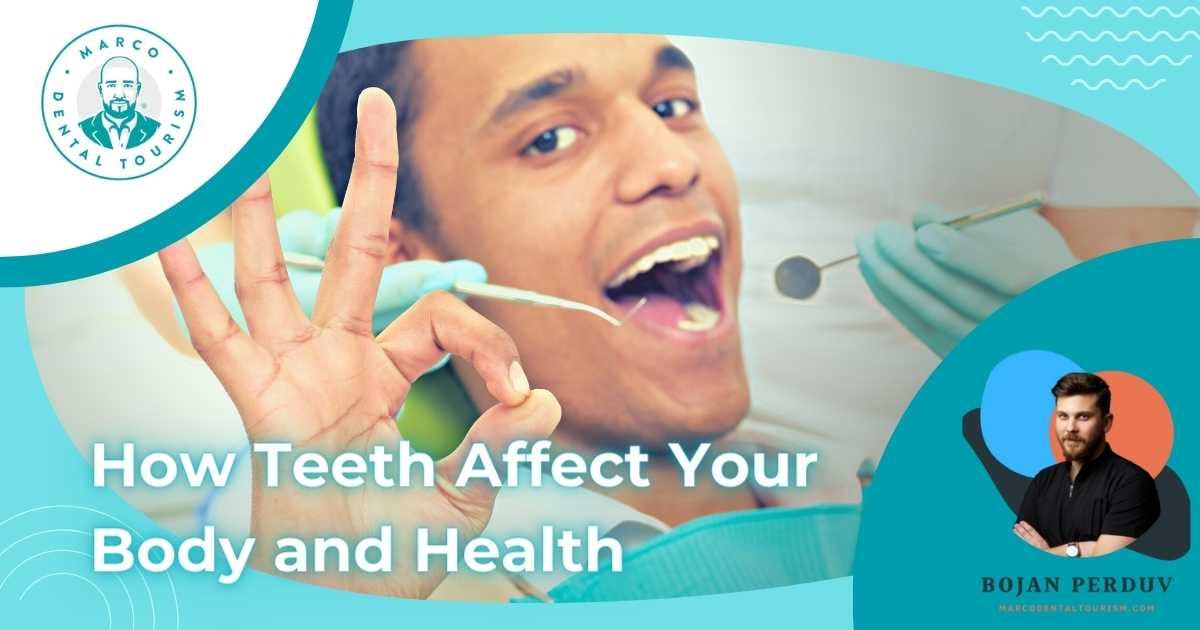The Influence of Teeth on the Health of the Entire Body

From the simple act of eating to the complex process of speaking, and even to the expression of emotions and individuality, our teeth form an essential part of our organism. We deal with the impact of teeth on the health of the whole organism and investigate how our teeth can have an impact on the skin, face, and brain.
Do teeth have an impact on other parts of the body?
Yes, teeth affect the whole body. Poor oral health, such as gum disease and tooth decay, can lead to infections that can spread to other parts of the body. In addition, the mouth is the entry point to the digestive and respiratory systems, so bacteria from the mouth can enter the bloodstream and cause numerous complications.
We have singled out several of the most important positive effects of our teeth on the entire body:
- Teeth support the digestion of food. With the help of teeth, we break down food and absorb all useful substances from it. This allows us to get essential vitamins and minerals that our body needs for normal functioning.
- Teeth provide jaw stability. The teeth help keep the jaw in proper alignment, leading to fewer headaches and neck pain.
- Teeth keep the mouth clean. Clean teeth are less prone to the accumulation of plaque, a sticky layer of food on the teeth and gums, which is the main cause of tooth decay.
- Teeth prevent bad breath. Well-kept teeth help prevent bad breath, which can be a very unpleasant dental problem caused by the accumulation of harmful bacteria and caries on the teeth.
- Teeth affect self-confidence. Neat teeth contribute to the feeling of a healthy and confident smile. Beautiful teeth can affect self-confidence, which is very important for any person's social interaction.
How do the teeth affect the jaw?

Healthy teeth are necessary for proper jaw posture. They provide support to the jawbone and help maintain its shape and form. Below we list a few more effects of teeth on the functions of our jaw:
- Normal functioning of the jaw: Properly arranged teeth are necessary for the normal functioning of the muscles that move the jaw. This allows for chewing food, speaking as well as forming various facial expressions such as anger and smiling.
- Reduce discomfort: Healthy teeth help prevent pain and discomfort in the jaw area. Crooked teeth can cause strain on the jaw muscles, which leads to a feeling of tension and discomfort.
- They form the contour of the face: Finally, neat teeth help shape the face, giving the face an attractive natural look.
What does the appearance of the tongue say about general health?

The appearance of the tongue provides insight into a person's general health, as changes in the color and texture of the tongue can indicate some health problems. For example, a white tongue can indicate poor oral hygiene or a yeast infection, while a red, swollen tongue can be a sign of vitamin or iron deficiency.
What is the role of the tongue as an organ?

The tongue as an organ plays a key role in speech, experiencing taste, chewing and swallowing food. The tongue also helps keep the mouth clean by removing food particles and excess bacteria. In addition, the tongue is an important component of the immune system, as it contains lymphoid tissue that helps fight infections.
We highlight the five most important roles of language:
- Facilitates swallowing food: The teeth break up pieces of food, preparing them for chewing, grinding, and breaking down, while the tongue helps to move the food in the mouth to break it down properly and to make the bite as easy as possible to swallow.
- Enables speech: The tongue helps us form words and speak clearly, while the teeth help shape the sounds we make.
- Protects the oral cavity: The teeth protect the tongue from hot or spicy food, and the tongue prevents us from injuring ourselves, i.e. from biting our own cheeks and lips when chewing.
- Helps us feel the taste of food: Taste receptors on the tongue identify different tastes, while teeth help break down food faster and digest it better.
- Keeps the mouth clean. The tongue helps remove food particles and bacteria from the teeth, and the teeth stop the food and bacteria from being washed away through saliva.
How do teeth affect gum health?
The teeth help protect the gums from the formation of harmful bacteria that can lead to the appearance of various diseases. On the other hand, the gums provide support for the teeth, helping the teeth to stay firmly in place.
Does dental health affect the nervous system?

Yes, dental health can have a huge impact on the nervous system. Poor oral hygiene causes inflammation of the gums and teeth, which can eventually affect the nerves in the jaw, face, and head. This leads to stress, tension and headaches.
Do teeth affect the skin?
Teeth play an important role in the health of our skin. Neglecting dental care can lead to the accumulation of bacteria, plaque, and with tartar that can cause acne and other irritations. In addition, often with grinding your teeth and unconsciously clenching your jaw can cause wrinkles to appear on your face.
How do teeth affect the face?

Healthy teeth can significantly improve the appearance of your face. We list several positive ways in which teeth affect the shape of our face:
- Harmonious appearance: Uniform teeth give the face a harmonious, symmetrical appearance.
- Smile: Healthy-looking teeth can create a confident smile that can make your face look more natural and beautiful.
- Reduced stress: During stress, clenching your teeth is one of the ways to release and express tension. When the teeth and jaw are relaxed or when we wear a mouth guard during sleep, we avoid frowning and wrinkling of the face.
Do teeth affect the brain?
Teeth help the brain because chewing releases essential substances from food that the body needs to use. The nutrients are then transported to the brain, where they are used to aid in cognitive processes such as memory, concentration, and problem-solving.
How to improve your dental and overall health?

Improving dental and general health means strengthening the body's immunity. Also, general health includes maintaining a healthy diet and hydration, regular exercise, adequate sleep, and stress management.
- Don't skip meals. Although nowadays it is very difficult to establish a diet, make an effort to place nutrition among the priority daily tasks.
Avoid sugary foods and drinks. The cause of dental caries, especially in children, is often an excessive intake of sweets, as well as sweetened juices.
Take time to rest. Don't forget that quality sleep is a crucial factor for a strong immune system.
Our Conclusion
It is very important to remember the impact of teeth, mouth, skin and all parts of the body on our daily life. Healthy meals, physical activity and regular check-ups will help ensure that all parts of the body remain in good condition and maintain overall mental and physical health. Taking the time to learn more about the different parts of the body, or how they work together, can help us better understand our body and learn how to properly care for it.












Share your opinion!
What do you think about this topic?
Comments (0)